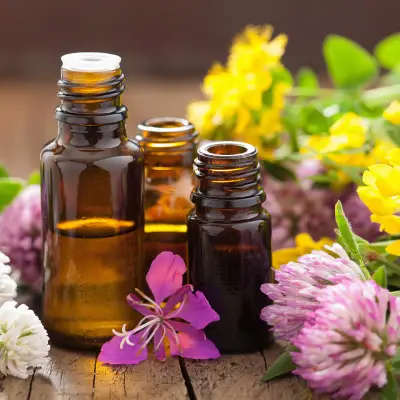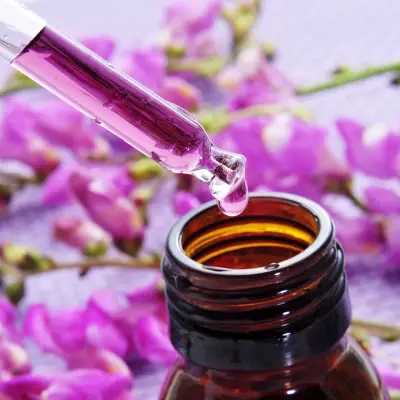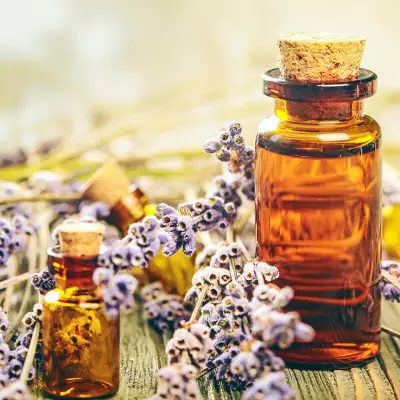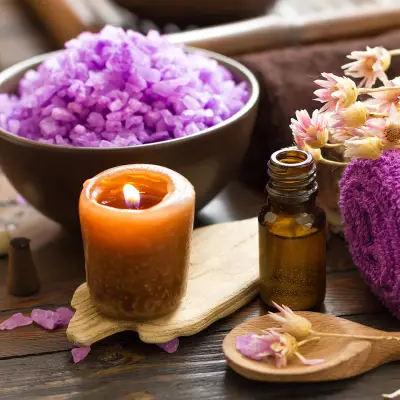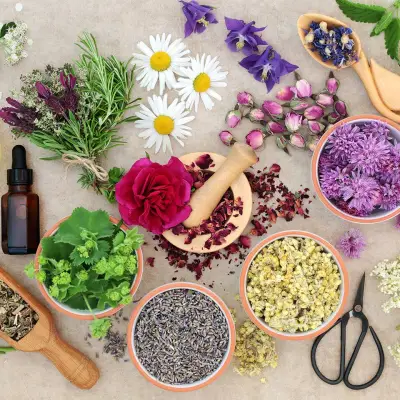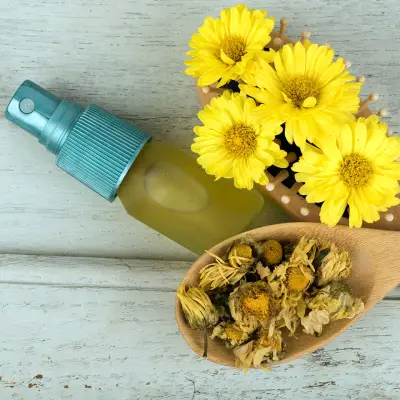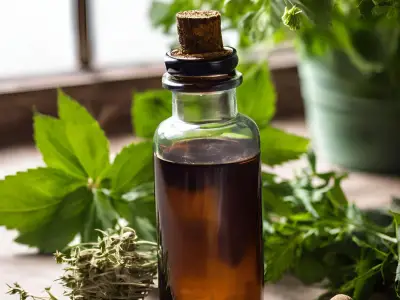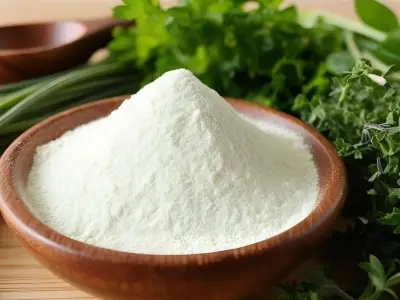As the years pass, many of us find ourselves searching for ways to keep our skin looking fresh and youthful. Fine lines, wrinkles, and dryness are all natural parts of ageing, but that doesn’t mean you can’t support your skin in looking its best. Essential oils are a popular, natural way to nourish your complexion and address signs of ageing.
In this guide, you’ll discover the best skin essential oils for ageing and wrinkles. Whether you're curious about what essential oil is best for your skin, or just looking for something that helps your face glow a little brighter, you’ll find everything you need to know.
This article is for informational purposes only and is not a substitute for professional medical advice, diagnosis, or treatment.
Jump to:
- Frankincense Oil – The Rejuvenator
- Rose Oil – The Hydrator
- Lavender Oil – The Soother
- Myrrh Oil – The Protector
- Sandalwood Oil – The Moisturiser
- Neroli Oil – The Collagen Booster
- Carrot Seed Oil – The Revitaliser
- Pomegranate Seed Oil – The Defender
- Geranium Oil – The Balancer
- Helichrysum Oil – The Repairer
- Sea Buckthorn Oil – The Nourisher
- Cucumber Seed Oil – The Refresher
- How to Use Essential Oils for the Skin
- Common Mistakes to Avoid When Using Essential Oils on the Skin
- Common Questions About Essential Oils for The Skin
- Study Our Essential Oils Diploma for £29
Recommended for you!
Best Sellers1. Frankincense Oil – The Rejuvenator
Frankincense oil is distilled from the resin of the Boswellia tree and has been cherished for centuries for its remarkable skin benefits. Known for its earthy and calming aroma, it is often regarded as one of the most luxurious aroma oils for skin.
How it works: Frankincense encourages cell regeneration and boosts collagen production, helping to firm and tighten ageing skin naturally. It also evens out skin tone and reduces the appearance of scars and sunspots. However, putting frankincense directly on the skin without dilution can be too strong, so always mix it with a carrier oil.
Skin type: Best for mature, dry, or combination skin. Avoid on highly sensitive skin without patch testing.
2. Rose Oil – The Hydrator
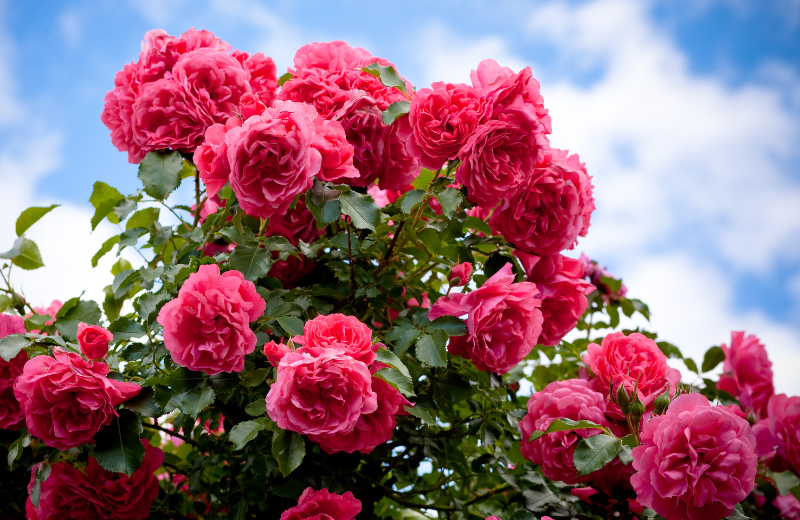
Rose oil is extracted from fresh rose petals, offering a rich, floral scent that feels like pure luxury. Highly prized for skincare, rose oil is one of the best choices if you’re exploring anti-ageing essential oils that can be used on the face.
How it works: Packed with antioxidants that fight free radicals, one of the leading causes of skin ageing, rose oil helps skin retain moisture, improving elasticity and radiance. It’s a brilliant choice if you want an oil that makes you look younger, keeping dry or mature skin supple and glowing.
Skin type: Ideal for dry, sensitive, and mature skin.
3. Lavender Oil – The Soother
Lavender oil, distilled from the beautiful purple lavender plant, has a relaxing scent and gentle healing properties. It's often the first essential oil people experience thanks to its versatility and mildness.
How it works: Lavender promotes skin healing, soothes inflammation, and helps smooth out fine lines. As one of the gentlest essential oils, it soothes irritation while supporting healthy skin renewal, making it ideal for daily use, even on sensitive skin.
Skin type: Suitable for all skin types, including sensitive and acne-prone skin.
4. Myrrh Oil – The Protector
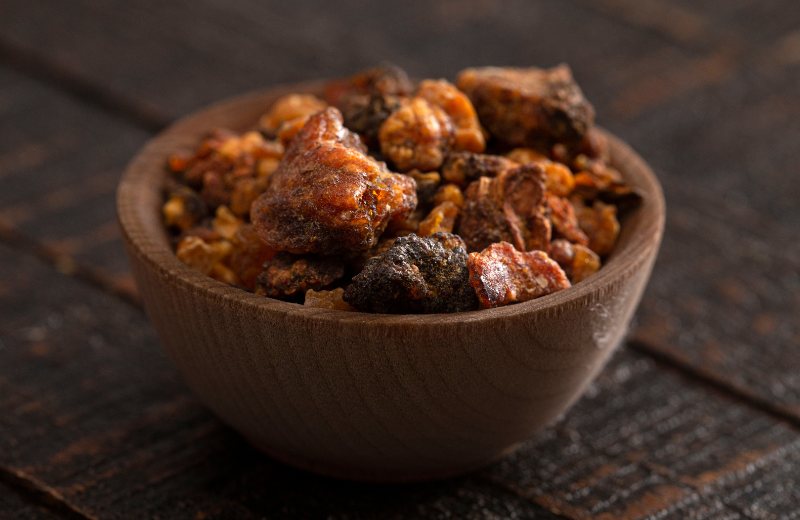
Myrrh oil comes from the resin of the Commiphora tree and has been used in beauty rituals since ancient Egyptian times. It has a warm, slightly spicy scent that adds a grounding feel to skincare blends.
How it works: Rich in antioxidants, myrrh protects against collagen breakdown and promotes skin suppleness. It strengthens the skin barrier, making it a superb choice for anyone seeking a healing essential oil for skin, particularly to prevent the sagging and dullness that can accompany ageing.
Skin type: Best for dry, mature, or sun-damaged skin.
5. Sandalwood Oil – The Moisturiser
Sandalwood oil is distilled from the heartwood of sandalwood trees and has a smooth, woody scent. It is commonly found in premium skincare formulations thanks to its calming and moisturising qualities.
How it works: Sandalwood soothes dry, irritated skin and helps soften fine lines, making it one of the best essential oils for mature or dehydrated skin. It works beautifully as a night treatment, deeply replenishing moisture while you sleep for a rejuvenated appearance come morning.
Skin type: Ideal for dry, dehydrated, and combination skin.
6. Neroli Oil – The Collagen Booster
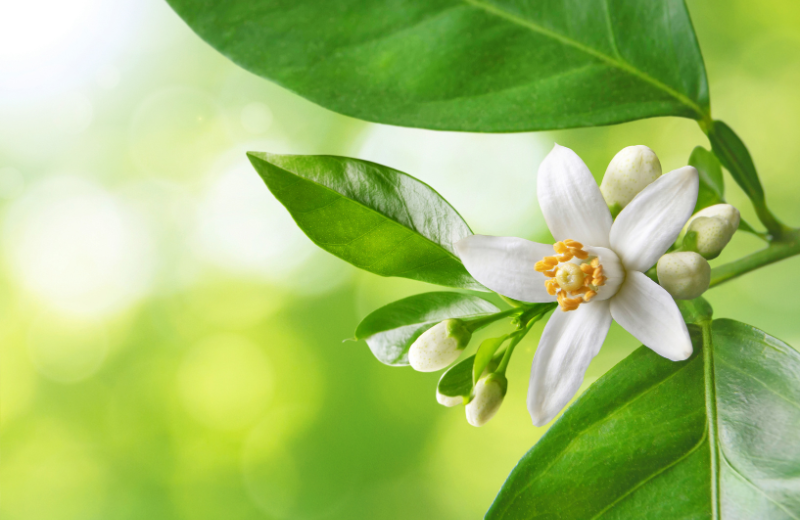
Neroli oil is derived from the fragrant blossoms of the bitter orange tree. Its sweet, floral aroma is uplifting and instantly refreshing, making it a favourite in luxury skincare.
How it works: Neroli helps the skin maintain elasticity and stimulates natural collagen production. Rich in antioxidants, it strengthens delicate skin, making it particularly effective if you're seeking collagen-boosting benefits for ageing and fragile complexions.
Skin type: Excellent for dry, sensitive, or mature skin.
7. Carrot Seed Oil – The Revitaliser
Carrot seed oil, extracted from the seeds of wild carrots, is highly prized for its regenerative properties. Its earthy scent and nutrient-rich profile make it a hidden gem among essential oils for mature skin.
How it works: Packed with vitamin A and antioxidants, carrot seed oil supports cell turnover and restores dull, tired skin. It helps to brighten and revitalise your complexion, leaving it looking firmer, more youthful, and full of energy.
Skin type: Best for ageing, dull, or sun-damaged skin. Avoid on oily or acne-prone skin.
8. Pomegranate Seed Oil – The Defender
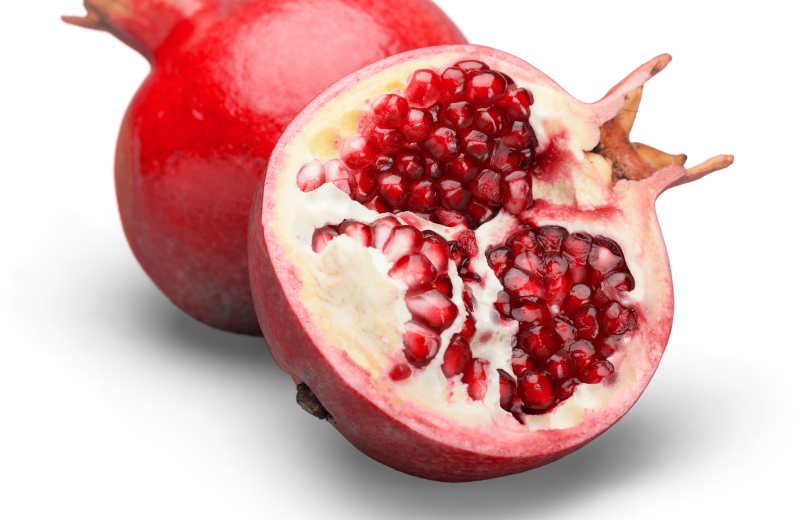
Pomegranate seed oil is cold-pressed from the seeds of the pomegranate fruit and has an incredible antioxidant power. It's an essential addition to any skincare routine focused on protection and renewal.
How it works: Rich in punicic acid and vitamin C, pomegranate seed oil shields the skin from environmental stressors while encouraging repair. It creates a natural barrier that helps lock in moisture, support healing, and reduce visible signs of ageing.
Skin type: Great for dry, mature, or environmentally stressed skin.
9. Geranium Oil – The Balancer
Geranium oil, with its sweet, rose-like scent, is extracted from the leaves and stems of the geranium plant. It’s often chosen for its ability to bring harmony both to the mind and the skin.
How it works: Geranium oil balances sebum production, tightens the skin, and improves elasticity. For those seeking smoothing and toning essential oils for the face, geranium delivers noticeable results while lifting the spirits with its beautiful aroma.
Skin type: Suitable for oily, combination, and mature skin.
10. Helichrysum Oil – The Repairer
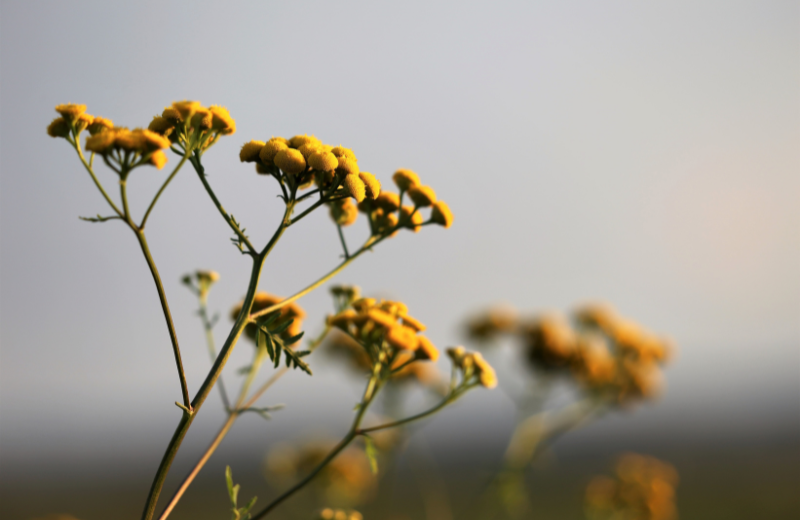
Helichrysum oil, sometimes called "Immortelle" or "Everlasting," comes from the delicate helichrysum flower. It’s one of the most sought-after oils for healing and anti-ageing.
How it works: Helichrysum promotes skin regeneration and is often described as an oil that works like Botox, naturally smoothing the appearance of wrinkles and fine lines without invasive treatments. It also reduces redness and supports skin recovery from sun damage and irritation.
Skin type: Ideal for sensitive, damaged, or ageing skin.
11. Sea Buckthorn Oil – The Nourisher
Sea buckthorn oil is extracted from the berries of the sea buckthorn shrub, packed with an extraordinary amount of skin-loving nutrients like omega-7 fatty acids.
How it works: This vibrant orange oil deeply nourishes dry, ageing skin and supports elasticity, helping the skin look plump and healthy. It enhances radiance and brings a noticeable brightness and vitality to the complexion, making it a popular choice for promoting a healthy glow.
Skin type: Excellent for dry, ageing, or irritated skin. May not suit very oily skin.
12. Cucumber Seed Oil – The Refresher
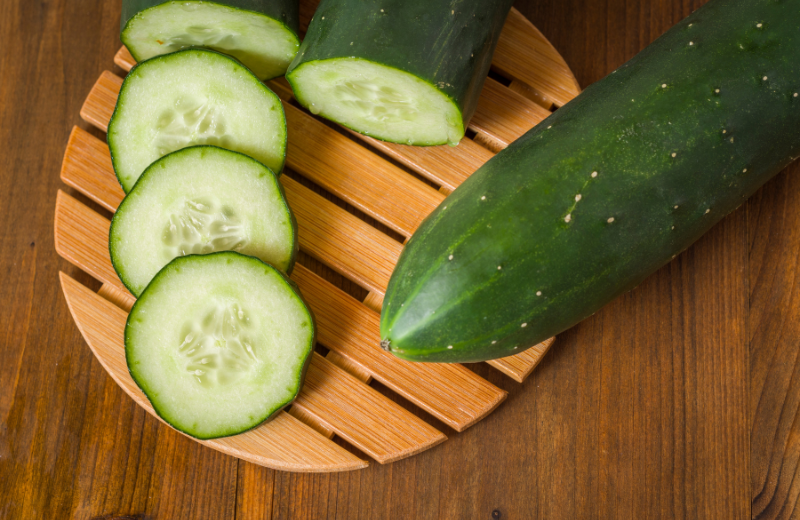
Cucumber seed oil is cold-pressed from cucumber seeds and carries a light, fresh scent that instantly feels soothing on the skin. It’s becoming increasingly popular in anti-ageing skincare thanks to its gentle yet powerful properties.
How it works: Cucumber seed oil soothes inflammation, hydrates thirsty skin, and improves firmness over time. It’s an excellent option for ageing skin, helping to keep the complexion supple, refreshed, and comfortably nourished without feeling heavy.
Skin type: Great for sensitive, combination, or overheated skin types.
How to Use Essential Oils for the Skin
Essential oils can do wonders for your skin, but only if you use them correctly. These simple tips will help you get the best results while keeping your skin safe.
- Dilute Before Use: Essential oils are highly concentrated and should never be applied directly to the skin. Always mix a few drops with a carrier oil such as jojoba, sweet almond, or rosehip oil. This makes the oil safe to use and helps prevent irritation.
- Do a Patch Test: Before applying any new blend to your face or body, test it on a small area of skin. Dab a little of the diluted oil on your inner wrist or behind your ear and wait 24 hours. If no irritation occurs, it should be safe to use.
- Match the Oil to Your Skin Type: Different oils benefit different skin types. Rose and frankincense are ideal for mature or dry skin, while lavender and geranium suit oily or combination skin. Choosing the right oil ensures your skin gets exactly what it needs.
- Apply to Clean, Damp Skin: For best results, apply your diluted oil to freshly cleansed, slightly damp skin. This helps seal in moisture and allows the oil to absorb more effectively, leaving your skin feeling nourished and soft.
- Avoid Harsh Oils: Some essential oils are too strong for use on the skin. Oils like cinnamon, clove, and oregano can cause stinging or redness, even when diluted. Stick to oils known to be gentle and skin-safe.
- Use Regularly for Best Results: Essential oils work best with consistent use. Apply your chosen oil daily or a few times a week as part of your routine. With time, you’ll notice improvements in texture, tone, and overall skin health.
Common Mistakes to Avoid When Using Essential Oils on the Skin
Essential oils can be incredibly beneficial, but a few common mistakes can stop you from seeing results, or irritate your skin. Being aware of these simple errors can make all the difference in how your skin responds.
- Using Undiluted Oils: Applying essential oils directly to your skin without a carrier oil is a common mistake that can lead to irritation, redness, or even burns.
- Choosing the Wrong Oil for Your Skin Type: Not every oil suits every skin type. Using the wrong one can clog pores, cause breakouts, or leave your skin feeling uncomfortable.
- Applying Too Much: More doesn’t mean better. Just a few drops of a properly diluted oil are enough; overdoing it can overwhelm your skin and waste your product.
- Skipping a Patch Test: Even natural products can cause reactions. Testing a small area first helps you avoid surprises, especially with new oils.
- Ignoring Sun Sensitivity: Some essential oils, particularly citrus oils like lemon or bergamot, can make your skin more sensitive to sunlight and increase the risk of burns or dark spots.
- Storing Oils Incorrectly: Heat, light, and air can affect the quality of essential oils. Keep them in dark glass bottles, tightly sealed, and stored in a cool, dry place.
- Assuming All Oils Are Safe for the Face: Just because an oil is safe for the body doesn’t mean it’s safe for the delicate skin on your face. Stick to oils known to be gentle and appropriate for facial use.
Recommended for you!
Best SellersCommon Questions About Essential Oils for The Skin
What essential oils should not be used on skin?
Oils like cinnamon, clove, and oregano are very strong and can be too harsh for most people’s skin, especially the face, even when diluted. Always choose oils that are clearly labelled as essential oils skin-safe safe and suitable for topical use.
Which oil is best for glowing skin?
If you're chasing that youthful glow, rose, sandalwood, and neroli oils are often considered among the best. These oils nourish deeply, support hydration, and leave the skin looking luminous and healthy.
Which oil is best for old skin?
Ageing skin tends to benefit from oils that offer deep moisture and support skin elasticity. Frankincense, rose, and pomegranate seed oils are some of the best oils for old skin, as they help to smooth fine lines and restore firmness.
How should you mix essential oils for skin?
A simple guideline is to add 3–5 drops of essential oil to 1 tablespoon of carrier oil. Store the mixture in a dark glass bottle and keep it away from heat and sunlight to preserve its quality. Blending carefully ensures your skin gets the benefits without irritation.
Can aromatherapy oils be used on skin?
Aromatherapy oils can be used on the skin as long as they are pure, natural essential oils and properly diluted. It’s important to avoid synthetic fragrance oils, which are not suitable for skin use and may cause irritation.
Can essential oils be used on the face every day?
Many essential oils can be used on the face daily, but they must be diluted and suitable for your skin type. Oils like lavender, rose, and frankincense are gentle enough for regular use and are among the best essential oils for your face when added to a consistent routine.
Study Our Essential Oils Diploma for £29
If you’re ready to learn more about the world of essential oils, or perhaps start your own business in this area, our Essential Oils Business Diploma Course is the perfect place to start. You’ll gain expert knowledge and practical skills, all at your own pace, and right now, you can enrol for just £29!


